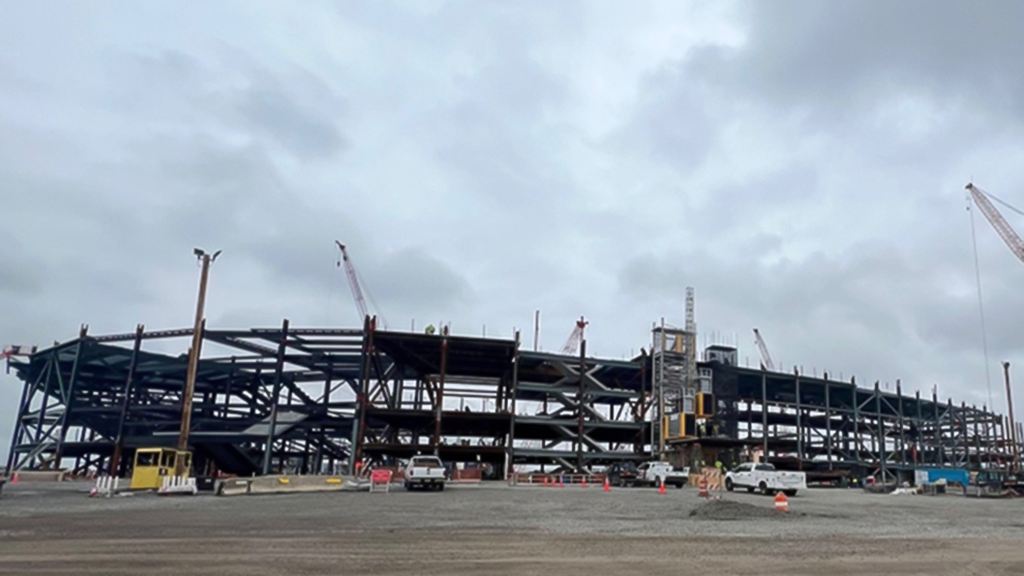ORCHARD PARK, N.Y. — The projected cost of the Buffalo Bills’ new stadium has ballooned to what team officials told The Associated Press is “north of $2.1 billion,” with owners Terry and Kim Pegula responsible for picking up the more than $560 million in overruns.
Bills president Pete Guelli said he was not surprised by the amount, given how the numbers have been tracking up since construction began 16 months ago. And he said the projected total represents the commitment the Pegulas have to the community because they are sticking to their vision for the facility without cutting corners to reduce costs.
“To sum that up, the Pegulas will not deviate from building a best-in-class stadium in Buffalo,” Guelli said.
“It’s going to be an exceptional fan experience, and incredible place to play. I think we’re very proud that we can build a facility like this in Buffalo and have it available to our fans,” he added. “We need this project to be a success for the team on and off the field, and it will be.”
Guelli said the increased costs will not impact the timetable for completion. The stadium is being built across the street from the Bills’ current home and is on track to open by June 2026.
Taxpayers are committing a combined $850 million to the project — $600 million from the state and $250 million from the county. At the time of the deal reached two years ago, that represented more than half the cost of construction, but now, taxpayers will be responsible for about 40%. The Bills are responsible for any overruns beyond $1.54 billion.
“I’m very pleased knowing that when all is said and done — and it still isn’t done, so it could go up even more — that the county is going to probably have contributed no more than 12% of the total cost, which is a pretty good deal,” Erie County executive Mark Poloncarz told The AP.
The Pegulas are now on the hook for $1.25 billion in construction costs, plus $144 million more as part of a community benefits package to be spread out over the 30-year lease.
The Bills are funding their share through an NFL loan program as well as raising money through a first-time seat licensing fee for season-ticket holders. Preliminary plans are also in the works to establish an entertainment zone, featuring restaurants, bars and shops, to be built once the existing stadium is razed.
Pegula is also raising money by seeking to sell off a minority share — no more than 25% — of the franchise, though Guelli said the reasons behind the move are not connected to increased construction costs. The Bills met with several interested groups over the summer and into September, with Pegula expected to identify a new partner by the end of the year.
The Pegulas bought the Bills for $1.4 billion from the estate of late Hall of Fame owner Ralph Wilson in 2014. Forbes most recently valued the Bills at $4.2 billion.
The new building will seat about 60,000, down from about 72,000 from the team’s existing stadium that opened in 1973 and is considered technologically outdated and experiencing cracks in its structure. Though the new stadium doesn’t include a roof, it will feature curved sides to cover a majority of seats.
And unlike the current facility, which faces east-west, the new building is positioned facing north-south to better protect fans from the winds that blow in off nearby Lake Erie.
John Polka, vice president of stadium development, said inflation played a significant role in the price jump by pushing up material construction costs. Two more contributing factors, he said, were increasing labor costs and design features that were added after the Bills completed their agreement with the state and county.
“We could have stopped at some point and said, let’s cut back. And that was not the case at all. In some cases, we’ve actually gone back in recent months and said, ‘Hey, we’ve got an idea or something that we think will enhance the fan experience or give us a better competitive advantage,’” Polka said. “And that’s really a testament to the Pegulas saying: ‘This is what we want to build. We designed it. This was our intent. There were reasons behind it, and we’re going to move forward with that.’”
New York’s Empire State Development, which will oversee the operation of the new stadium, noted that aside from having the state’s share reduced to about 29%, the negotiated deal also resulted in $462 million in contracts awarded to minority and women-owned businesses.
Guelli, who took over as president of the Bills and the Pegula-owned NHL Sabres in March, noted the significance of what the new stadium represents by recalling Bills fans’ fears of the franchise relocating when he previously worked for the team in the 2000s.
“People were talking about the Bills potentially leaving and now there’s a $2 billion stadium going up across the street to keep the team in Buffalo long term,” Guelli said. “It’s pretty gratifying for everybody to be a part of it, especially with the Pegula family.”











Recent Comments
comments for this post are closed